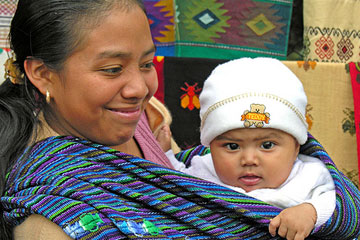
By Jackie Brinkman | University Communications
AURORA, Colo. - The Regents of the University of Colorado are pleased to announce that the University of Colorado have been awarded a grant by the Bill & Melinda Gates Foundation. The grant,in the amount of more than $11 million, is to support research to normalize early growth of offspring of mothers in poor communities with high rates of early growth retardation. Michael Hambidge, MD, ScD, professor emeritus principal investigator and Nancy Krebs, MD, MS, professor both from the Nutrition Section, Department of Pediatrics, University of Colorado School of Medicine have the responsibility for the organization and conduct of this project.
Hambidge and Krebs have previously researched that it is not enough to provide babies with good nutrition after birth and are impressed with the growing evidence of the special importance of maternal nutrition before and in early pregnancy. Their objective is to determine the benefits to the babies of women in poor, food insecure environments by comparing the benefits of commencing a daily maternal multiple micronutrient-fortified lipid based nutrition supplement (with additional calories for underweight participants) at least three months prior to conception versus the benefits of commencing the same supplement at 12 weeks gestation. The offspring of each of these groups will also be compared with those of a concurrently randomized control group which receives the same home visits and education/support for hygiene and nutrition including breastfeeding. The equipment and experienced personnel are already in place at each site. The sites for the study will be in Guatemala, Pakistan, India, and Zambia.
“Many nutrition-related interventions, including some of our own, have had surprisingly little impact on reproductive outcomes, including especially postnatal infant growth. The evidence strongly points to the importance of extending the critical window to the health of the woman before she enters pregnancy because so much of the programming for later outcomes occurs in the very earliest days and weeks of gestation,” Krebs said. “The challenge to improve the nutritional health of women before they become pregnant is very daunting, but the beneficial pay-off is potentially profound.”
Upon hearing of the grant funding Hambidge said “With respect to the challenge ahead, it has become increasingly apparent that the cause of much of the excessive morbidity and mortality in poor, food insecure populations begins with poor nutrition in the parents, especially the mother. Moreover, there is increasing recognition that the early weeks of pregnancy and the parents’ nutritional status before conception are of vital importance. Yet hard evidence is still very limited because of the research challenge imposed by the difficulty of predicting conception and of even being aware of the early critical days in the development of the baby. These may be adversely effected directly by a poor nutrition environment in utero or/and a little less directly by the adverse effects of a poor maternal environmental on her genome which is then passed on to effect the epigenome of the baby in utero and, we believe, after birth. The project is complex and will depend on multiple collaborations, globally and in this country and university.
Preventing malnutrition of virtually all women of child-bearing age is a tremendous programmatic challenge, the value of which needs to be clearly defined to justify this huge addition to the many programs already funded to treat malnutrition in young children.”
This grant runs for five years.
Contact: Jackie.Brinkman@ucdenver.edu
